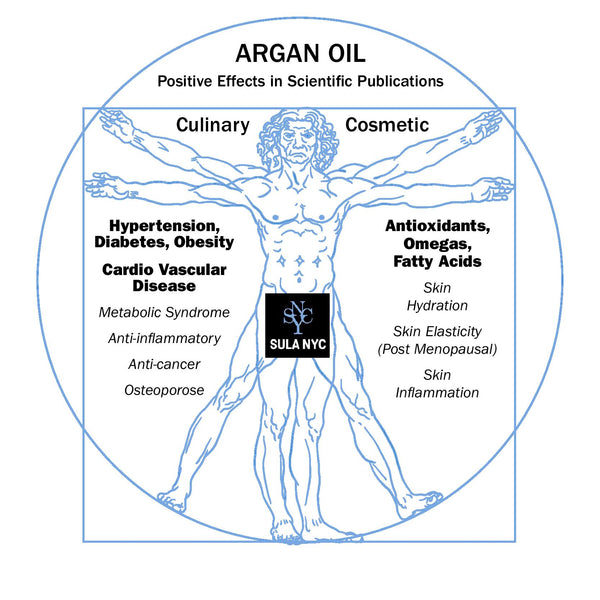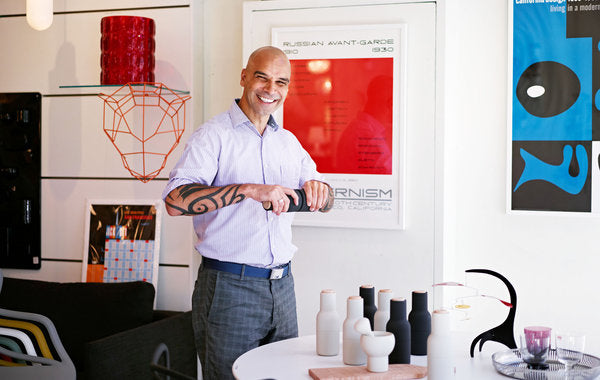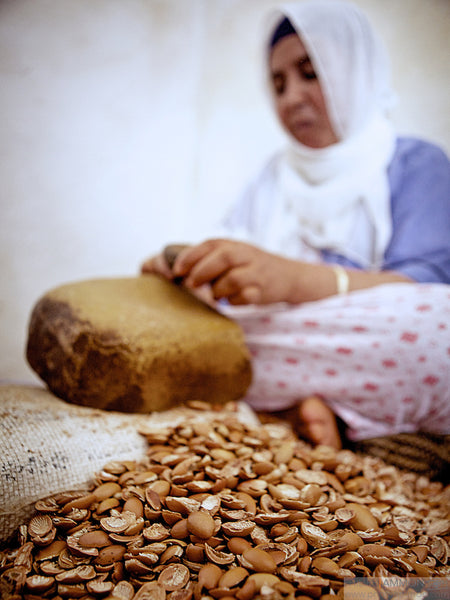Have you heard of Unesco’s ‘Representative List of the Intangible Cultural Heritage of Humanity’? Ha! Neither did we, but here is some info: http://www.unesco.org/culture/ich/en/what-is-intangible-heritage-00003.
We read about the Unesco list in African Nutrition Matters - Winter 2016, an article by Prof. Abdelfettah Derouiche and Dr. Ali Jafri: ‘Review of the Therapeutic benefits of Argan oil’.
The authors, both faculty members of the University Hassan II, Casablanca, Morocco report on some of the work that has been done on the effects and properties of Argan oil. The high percentage of unsaturated fatty acids is more than likely to be the reason behind some of the pharmacological properties of argan oil. Many of Argan oil’s specific health benefits are attributed to its high tocopherol content and composition of the unsaponifiable matter.
In the article the effects for Culinary and Cosmetic Argan oil are mentioned. For starters, the benefits of cosmetic argan oil are reported on skin elasticity for postmenopausal women; an anti -aging (not our favorite term) effect was demonstrated. Also an anti-sebum effect - that is a reduction of sebum and the area covered with oily spots - was demonstrated. So science backs us up: Argan is great for your skin. You know we only sell pure -undiluted- argan oil, Extra Virgin, Cold-pressed and USDA organic certified.


Prof. Derouiche and Dr. Jafri also report on Culinary (roasted) Argan oil.
Cardiovascular prevention, Cancer prevention, Hormonal properties and Antidiabetic properties are addressed.
A significant increase in good cholesterol and decrease in triglycerides was shown in a trial on the hypolipidemic activity of Argan oil. Daily consumption of 25 ml oil during 3 weeks delivered results. The so-called ‘Mediterranean diet’ benefits us even more if Argan oil is used - the culinary version can replace olive oil- and we think it is super tasty as well. And Argan oil is safe to use; pure as can been for food, skin and hair.
Current Rheumatology Research, edition 12- 2016, editor-in-chief Dr. Serena Guiducci, University of Florence, Italy, has an article ‘Efficacy of Argane oil on metabolic syndrome in a Moroccan knee osteoarthritis population’. Six scientists, affiliated with the Department of Rheumatology, University Hospital, Fez, Morocco and spearheaded by Prof. Dr. Mourad Errasfa, USMBA and GRETHA, Morocco report on metabolic syndrome and Argan oil.

The authors characterize Metabolic Syndrome when a patient has three of the five below described medical parameters:
- Abdominal obesity
- Elevated blood pressure
- Elevated fasting plasma glucose
- High serum triglycerides
- Low HDL cholesterol.
These conditions represent a key element in cardiovascular diseases.
Prof. Errasfa et al. define knee osteoarthritis as a degenerative disease which was shown to be affected by some of the parameters of metabolic syndrome.
The abstract of the study: Edible Argan oil is used in moroccan folk medicine against several health conditions, such as knee osteoarthritis, though, evidence -based medical data about the above health benefit from Argane oil treatment are lacking. In the present clinical controlled study, we have found that consumption of Argane oil by 38 patients who have knee osteoarthritis and metabolic syndrome can improve several of their metabolic syndrome parameters and decrease their blood lipid atherogenic ratios.
The present clinical study, to the best of our knowledge, is the first one to show that Argane oil consumption could be a therapeutic preventive tool against key cardiovascular risk factors of metabolic syndrome in knee osteoarthritis patients.
Read more in a Doctinews article: http://www.doctinews.com/index.php/alternative/item/4830-huile-dargane
ARGAN Oil for Clinical Trials
We at SULA NYC support scientific research by providing Argan oil for clinical trials.
Please contact us: whatif@sulanyc.com for more info and to discuss opportunities to sponsor Argan oil. We regret we can’t provide a monetary contribution, but will open our network to share knowledge. GRETHA -Groupe des Research Theraupatique de L’Huile d’Argan is a Body of Knowledge we support. More info on GRETHA? See our blogs or email: mourad.er-rasfa@usmba.ac.ma

The international Journal of Recycling of Organic Waste in Agriculture is not a journal we’re familiar with, although ‘Organic’ and ‘Recycling’ are of major interest to us.
Biochar, the subject of an article in the Journal: ‘Biochar from argan shells, production and characterization’, was also new to us. The use of biochar can enhance soil structure, nutrients and water holding capacity.
Learn more on Biochar (‘charcoal’): http://www.biochar-international.org/biochar
The article, also by six scientists - Laila Bouqbis et al., University Ibnou Zohr, Agadir, Morocco - concludes the use of argan shells biochar to enrich the soil will be expected to improve both nutrient and water retention especially in the areas which are subject to frequent droughts.

Abstract, again also a first research study with promising results on Argan:
The agricultural practices in south western Morocco reserve a majority of the water resources to be used for irrigation. The extent of irrigated agriculture combined with high evaporative rates, lead to the depletion of water resources and degrading of soil quality.
To remedy this problem, biochar, a pyrolysed biomass, is highly considered to improve retaining of water and nutrients in soil. For this biochar research, argan shells were used as the biomass source to produce biochar.
To the best of our knowledge, no research to date has been carried out on the production and characterization of biochar produced from argan shells wastes.
Results:
The physical and chemical properties of the argan shells biochar revealed a highly alkaline pH, high electrical conductivity, high content of K,Na, Mg and NaNO3, low content of Ca, KH2PO4 and low content of heavy metals compared to sandy soil and peat. In addition, by increasing biochar application, the water holding capacities of biochar-sand mixtures also increased.
Prof. Mustapha Khali and Dr. Hadjira Dakiche, University Saad Dahlab, Blida, Algeria, published ‘Biological activities and phenolic contents of Argania spinosa leaf extract’ in Tropical Journal of Pharmaceutical Research, December 2016. Together with 3 scientists from the Jordan University of Science and Technology, Jordan they concluded Argania spinosa leaf extract is rich in valuable biologically active compounds and could represent a new resource for natural and preventive therapies.
Prof. Khali, Dr. Dakiche and Dr. Houcine Boutoumi published ‘Phytochemical Characterization and in ivo Anti-inflammatory and Wound-healing Activities of Argania Spinosa Skeels Seed oil’ in Records of Natural Products, 11:2 (2017). This is a relatively new magazine we cite as the study also supports the trend of potential benefits of Argan oil. The findings revealed a rich content of monounsaturated and polyunsaturated fatty acids and presence of phenolic acids. Argan oil exhibited a reduction of inflammation and facilitated a healing process without any irritation. The experimental study revealed that Argan oil displays remarkable wound-healing and anti-inflammatory activities related to its chemical composition. Argan oil has positive potential for skin medicinal application.

As you may know from our previous blog posts, SULA NYC is not a fan of in vivo research. A little earlier this year also an in vivo study with Argan oil was published on wound-healing. In Ostomy Wound Management. March 2016 “The Effects of Argan Oil in Second-degree Burn Wound Healing in Rats’. 7 Turkish scientists - Umit Avsar MD et al. from Ataturk University, Kafkas University, Agri University, Kirikkale University and the Research and Education Hospital in Erzurum researched second-degree burn wound healing.
Argan treated groups showed significant increased contraction: an indicator for wound healing. The results suggest Argan oil is effective in healing experimentally created second-degree burns in rats. Prospective, randomized, controlled clinical studies are needed to evaluate the safety, efficacy and effectiveness of this treatment modality for patients with second-degree burns.
